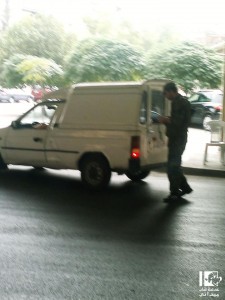Damascus: Checkpoints from Hell

Um Ward al-Suriyya
My home city, Jaramana, lies between Damascus and the agricultural area of Al-Ghuta. I have a lot of memories in both those places, and also friends whom I visit from time to time to make sure they are all right. They live in hotbeds of revolution where fighting and artillery shelling are commonplace. When that happens, all forms of communication are interrupted.
It is also difficult to visit them because of all the checkpoints manned variously by the Syrian army, other security agencies and pro-regime militias. These checkpoints have proliferated since the explosion in July that killed top military aides to President Bashar al-Assad.

Every time I think about them, I recall how difficult these checkpoints have made it to deliver food and medical supplies to people living under siege.
There are many violent incidents at these checkpoints, involving heavily-armed members of the security forces on the one side, and the average citizen on the other. Officers search cars and interrogate pedestrians, often in a humiliating manner.
They are on the lookout for opposition activists, or simply anyone with an ID that shows they come from a rebellious area like Daraa; Hama or Deir al-Assafir.
Sometimes people are killed for no reason at all. I witnessed one such incident on the approaches to Aqraba, a town outside Damascus.
It was May 15 this year, at about three in the afternoon, the time when people usually finish work and go home.
I was in my car, heading for home after picking up my son from his school, located on the airport road. At the entrance to Aqraba there is a checkpoint manned by members of Air Force Security and Air Force Intelligence. It sits at the intersection of three roads, and all of them were jammed with cars waiting to get through.
I waited just like everybody else, stopping, crawling forward and then coming to a halt again for ten minutes at a time.
Everyone was getting angry. As we queued, one man got out of his car and went over to the security officers. He seemed to be asking them about the delay. They started raising their voices and pointing at the cars. Then suddenly, one of the officers grabbed his rifle and shot the man dead.
Everyone saw it, women and children as well. As children started screaming, my son asked me, “Is he dead?” I lied to him and said the shots had missed him, but my son said he saw blood covering the man’s clothes.
The other adults and I were paralysed, too terrified to leave our cars to check whether the man was still alive and offer first aid.
These checkpoints present a real risk to anyone trying to document the effects of artillery shelling and fighting in the countryside around Damascus.
On the afternoon of September 17, rebel fighters from the Hamza Battalion of the rebel Free Syrian Army, FSA, targeted an army post on the Fourth Bridge, which leads off the airport road. (The leader of that battalion was later killed on September30). Regular army units at that position had used tanks and machine guns to fire on the villages of Shebaa and Deir al-Assafir.
After the FSA attack on the position, government planes carried out strikes on the two villages, causing many casualties both among FSA members and civilians, as well as doing a lot of damage.
When the bombing stopped, I was asked to come in to film and document the casualties and destruction. I decided I would go there at ten in the evening, and I called to ask a friend of mine to drive me. I call him “the revolution’s taxi driver”.
We were stopped at a checkpoint, and security officers asked where we were going. I had concealed some medical supplies in the car, but I was able to chat and joke with them so that they let us through without a search.
Once safely through, we took an unlit back road that went through some orchards. It was pitch-black, but we had to turn the car lights off because we were close to the place where the clash had taken place, and there were snipers who would fire at anything that moved. After that stretch, my friend sped up until we reached Shebaa.
The drive from Jaramana to Shebaa would normally take ten to 15 minutes, but that day it took us an hour and a half, because we vacillated between carrying on and turning around to take another route, and also because we had to drive slowly with the headlights off.
I have developed an expert knowledge of which roads are free of checkpoints. Nor am I the only one familiar with them – revolutionary activists and ordinary residents alike use them on a daily basis in Damascus and the surrounding countryside.
